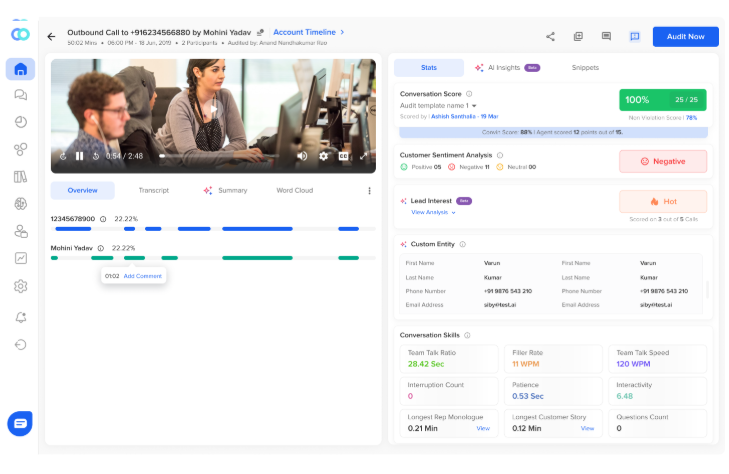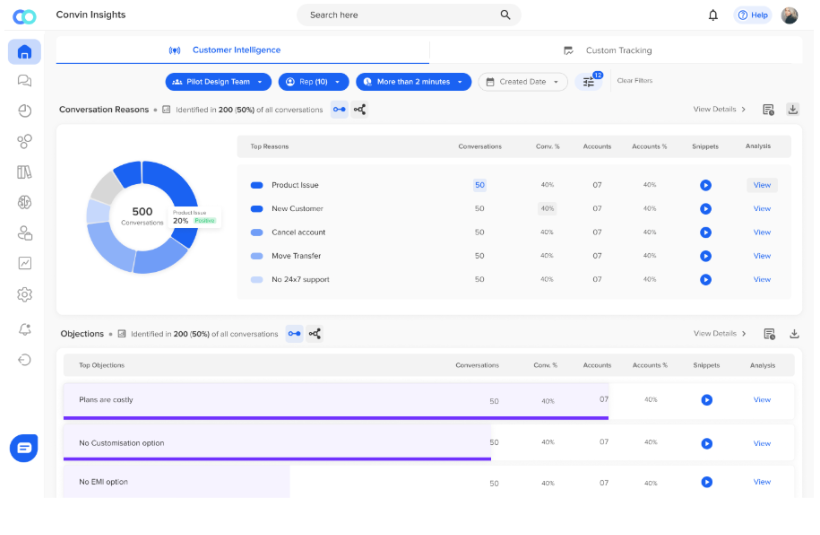Generative AI in insurance isn’t a buzzword anymore, it’s a boardroom imperative. From frontline agents to underwriting desks, AI is reshaping how insurers operate, sell, and serve. Yet, many leaders still view it through a distant lens: experimental, unscalable, or stuck in the pilot phase.
This blog changes that perspective. Inside, we unpack real, immediately implementable use cases that insurers are already adopting, across claims automation, chatbot personalization, AI-driven coaching, and smarter underwriting.
You’ll see how platforms like Convin bring it all together, blending voice data, customer insights, and live agent support into one connected system.
If you're exploring how to boost productivity, cut churn, or win policyholder loyalty in a crowded market, this isn't just a guide. It’s your AI playbook. Let's dive in.
Try Convin’s AI suite on your next sales call
Enhancing Agent Operations with Generative AI in Insurance
Insurers are under constant pressure to streamline internal workflows while delivering exceptional customer service. With generative AI in insurance, frontline agents are becoming faster, more accurate, and more confident in every customer interaction.
1. AI For Insurance Agent Productivity And Accuracy
Generative AI is reshaping how insurance agents engage with customers. Rather than juggling screens, systems, and call scripts, agents are now supported by real-time intelligence. Tools like Convin’s real-time agent assist empower them to:
- Receive instant coaching prompts during live conversations
- Auto-generate detailed call summaries without manual effort
- Surface relevant policy data exactly when it's needed
These capabilities aren't theoretical; they're live, in-market, and proven.
Convin’s system delivers contextual talk tracks, compliance nudges, and actionable guidance as conversations happen, not after. This minimizes error, increases confidence, and accelerates resolution time.
According to McKinsey, AI technologies can drive up to 30% improvement in operational efficiency for insurers.
That translates to less time wasted on admin, and more time building customer relationships that drive renewals and growth.
2. Insurance AI Chatbots For Smarter Customer Support
Support desks have traditionally been a high-cost, high-pressure function. But generative AI in insurance is rapidly changing that equation. When paired with AI insurance automation, chatbots are no longer a novelty; they’re a frontline enabler.
Using insights mined from Convin’s conversation intelligence platform, insurers can deploy chatbots that:
- Operate 24/7 in multiple languages
- Respond instantly to policy, claims, and renewal queries
- Provide contextual and personalized guidance based on customer behavior
These chatbots are trained on real historical conversations. That means they learn what your customers actually ask and how your top agents respond.
The outcome? Drastically reduced wait times. Higher first-contact resolution. Improved CSAT.
This isn’t about replacing human agents. It’s about freeing them up to handle complex queries where empathy and judgment matter most.
Try Convin’s Real-Time Agent Assist on your next sales call
Transforming Claims And Underwriting Through Generative AI in Insurance
Claims and underwriting are among the most document-heavy and error-prone processes in the insurance sector. Manual reviews, redundant paperwork, and fragmented systems often slow these workflows to a crawl.
Enter generative AI in insurance, bringing speed, accuracy, and intelligence to everything from fraud detection to policy issuance
1. AI Claims Processing For Speed And Transparency
Traditional claims processing is slow by design. It often involves multiple rounds of manual review, repetitive data extraction, and lengthy wait times for approval or updates. These inefficiencies frustrate both customers and agents.
With AI claims processing, insurers are automating the entire pipeline:
- Natural language processing (NLP) parses documents instantly
- Generative models detect inconsistencies and potential fraud
- Real-time claim updates are sent to policyholders with zero delay
A study by Accenture found that insurers leveraging AI in claims see a 60% reduction in turnaround time.
This isn't just about faster claims. It's about building consistency, eliminating bias, and earning trust, one decision at a time.
2. AI For Insurance Underwriting Automation
Underwriting has traditionally depended on historic data and risk tables, but generative AI in insurance brings in forward-looking intelligence and automation.
Today’s AI systems can:
- Generate dynamic risk scores by simulating diverse scenarios
- Convert customer conversations into structured text using voice-to-text
- Auto-create initial policy drafts based on call summaries and customer inputs
Convin’s voice of customer software plays a pivotal role here. It captures real-time insights from every interaction, tone, sentiment, objection, and feed and feeds that data back into the underwriting decision process.
The result? Underwriters gain a deeper, real-world context on each applicant. That enables:
- Smarter pricing decisions
- Finer-grained risk segmentation
- Higher retention with more personalized policies
With generative AI, underwriting evolves from a rules-based checklist into a nuanced, responsive process, backed by data and guided by customer voice.
Feed real customer data into smarter underwriting decisions
This blog is just the start.
Unlock the power of Convin’s AI with a live demo.

Redefining Sales And Customer Experience With Generative AI in Insurance
When product offerings are nearly identical across providers, experience becomes the true differentiator. This is where generative AI in insurance shines. It equips insurers to sell more effectively, personalize interactions at scale, and respond intelligently to evolving customer needs.
1. Insurance AI Chatbots For Personalized Policy Recommendations
Today’s insurance buyers expect experiences tailored to their specific needs, not one-size-fits-all offers. Generative AI makes this possible at scale.
By analyzing behavioral and conversational data, insurance AI chatbots can now:
- Automatically recommend the most relevant policies
- Upsell or cross-sell based on timing and context
- Respond instantly to nuanced product questions
These aren’t basic bots with rigid flows, they're adaptive systems powered by real conversational data.
Using Convin’s voice of customer insights, insurers can train chatbots to understand buyer intent, handle objections, and personalize engagement dynamically.
The outcome? Smarter selling, greater relevance, and a customer experience that feels genuinely personalized, not scripted.
2. AI For Insurance Sales Coaching And Real-Time Support
Performance-driven agents thrive on relevant feedback. But feedback that comes late is often feedback wasted. That’s where generative AI in insurance makes a difference, by delivering insights in real time.
With tools like Convin’s real-time agent assist, agents get:
- Instant prompts for handling objections more effectively
- Live compliance alerts to reduce regulatory exposure
- Automated coaching insights right after every interaction
This enables agents to course-correct in the moment, not months later. And since Convin’s AI learns from your top performers, it scales what already works.
The result? Smarter calls, faster improvement, and a consistently high-performing team across the board.
Improve sales coaching with real-time performance feedback
Powering Insurance Operations With Convin’s Generative AI Capabilities
Generative AI is transformative on its own, but its real power emerges when it’s embedded within a connected intelligence ecosystem. Convin delivers that ecosystem by unifying real-time agent support, conversation analytics, and customer feedback into a single, AI-driven platform.
This integration gives insurers complete visibility across sales, service, and support, while streamlining performance coaching and compliance monitoring. Every interaction becomes an opportunity for insight, every call a source of strategy.
With Convin, generative AI moves from tactical automation to a scalable, strategic advantage.

1. AI Insurance Automation Using Convin’s Real-Time Agent Assist
Convin’s real-time agent assist helps insurance teams execute at their best, even in high-stakes conversations. The tool enables:
- Real-time call prompts that guide agents on how to sell with empathy, stay compliant, and respond with impact
- Dramatically shorter ramp-up times for new agents by embedding best practices into live workflows
- Always-on monitoring that ensures consistency without introducing human bias or management overhead
With this solution, insurers don’t just react to performance issues; they prevent them. Every interaction becomes brand-consistent, customer-centric, and fully compliant.

2. Generative AI Use Cases In Insurance With Conversation Intelligence
Great conversations create great customer experiences, and patterns in those conversations hold immense value.
With Convin’s conversation intelligence, insurers can:
- Analyze exactly what top-performing agents do differently
- Track emerging themes across thousands of calls
- Detect operational issues or policy gaps before they escalate
The platform automatically tags tone, intent, objections, and resolutions, giving teams not just data, but actionable intelligence.
It becomes a strategic engine for coaching, training, and proactive business decisions.
3. Voice Of Customer Software Enabling AI For Insurance Excellence
Understanding what customers say is only part of the picture. What truly drives differentiation is knowing how they feel and why.
Convin’s voice of customer software goes beyond transcription to:
- Detect emotion in real time
- Predict churn before it happens
- Uncover sentiment trends across calls, chats, and channels
These aren’t after-the-fact insights; they’re proactive signals that help insurers redesign products, refine messaging, and retain high-value policyholders.
The result? More relevant products. More loyal customers. And a far more competitive brand.
Unify voice, analytics, and AI coaching in one platform
The Future Of Generative AI In Insurance
From claims to customer service to sales enablement, insurers deploying AI now are gaining measurable advantages in efficiency, accuracy, and customer experience. As pressure mounts to deliver faster, smarter, and more personalized service, AI adoption is quickly becoming the new baseline.
What separates top performers is not just the use of generative AI, but how well it’s integrated into their broader ecosystem. Platforms like Convin don’t just support AI, they amplify it, weaving intelligence across voice data, agent behavior, and customer feedback.
The result? Streamlined operations, compliant conversations, and high-performing insurance teams ready for tomorrow’s challenges.
The future of AI insurance automation will belong to those who act decisively. Insurers that embrace end-to-end solutions like Convin will lead in loyalty, innovation, and cost-efficiency.
Explore Convin's AI platform to future-proof your insurance operations today
FAQ
- What are the generative AI use cases in life insurance?
Generative AI in insurance helps life insurers streamline policy generation, automate claims review, detect fraud, and personalize policyholder communication. Tools like Convin’s Conversation Intelligence also support sales teams with real-time coaching and underwriting insights based on customer intent and sentiment.
- What are some practical uses of generative AI today?
Practical uses of generative AI include:
- Real-time agent support and call summarization
- Automated claims processing
- Personalized policy recommendations via chatbots
- Underwriting risk prediction
Platforms like Convin combine these into one operational layer, improving both service quality and efficiency.
- What is the practical use of generative AI in healthcare?
In healthcare, generative AI is used for:
- Medical transcription and note generation
- Clinical documentation
- Personalized treatment recommendations
- Patient sentiment analysis
While outside insurance, these use cases mirror how platforms like Convin apply AI for faster documentation and compliance in regulated industries.
- What are the challenges of AI in insurance?
Key challenges of AI in insurance include:
- Data privacy and regulatory compliance
- Lack of explainability in AI decisions
- Legacy systems integration
- Talent gaps in AI operations
Platforms like Convin mitigate these by offering explainable AI features and seamless integrations across claims, service, and sales workflows.



.avif)





.avif)